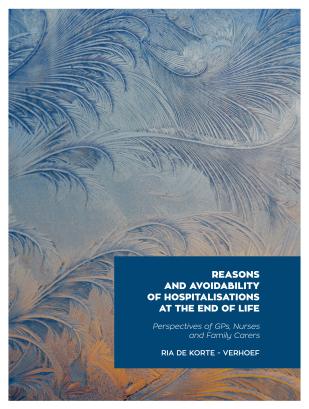Author: Ria de Korte- Verhoef
Date: 03-09-2014
Promotor: Prof. dr. Luc Deliens, Prof. dr. Bregje Onwuteaka-Philipsen and Prof. dr. Anneke Francke
Co-Promotor: Prof. dr. Roeline Pasman
SUMMARY OF THE DISSERTATION
Background
Although many patients prefer to stay and die at home at the end of life, many are hospitalised. Little is known about how to avoid hospitalisations for patients living at home.
Aim
To describe how hospitalisation at the end of life can be avoided, from the perspective of the GPs, nurses and family carers.
Method
A qualitative design with face-to-face interviews was used. Taking 30 cases of patients who died non-suddenly, 26 GPs, 15 nurses and 18 family carers were interviewed in depth. Of the 30 patients, 20 were hospitalised and 10 were not hospitalised in the last three months of life.
Results
Five key themes that could help avoid hospitalisation at the end of life emerged from the interviews. The key themes were: 1) marking the approach of death, and shifting the mindset; 2) being able to provide acute treatment and care at home; 3) anticipatory discussions and interventions to deal with expected severe problems; 4) guiding and monitoring the patient and family in a holistic way through the illness trajectory; 5) continuity of treatment and care at home. If these five key themes are adopted in an interrelated way, this could help avoid hospitalisations, according to GPs, nurses and family carers.
Conclusions
The five key themes described in this study can be seen as strategies that could help in avoiding hospitalisation at the end of life. It is recommended that for all patients residing at home, GPs and community nurses work together as a team from the moment that it is marked that death is approaching up to the end of life.

